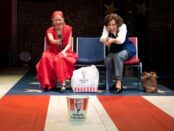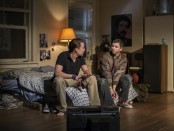The Good John Proctor
Unfortunately, Monohon’s play which takes its cues from Miller’s drama, assumes a thorough knowledge of "The Crucible" and leaves out a great deal of information that would make it easier to follow. For example, John Proctor’s name is never uttered by the girls even after Abigail goes to work for him and his wife in the play. Caitlin Sullivan’s direction is too tame by far so that the play is not very dramatic. The most exciting event, the trial itself, is left as an afterthought and narrated years later by one of the girls after her death. [more]







